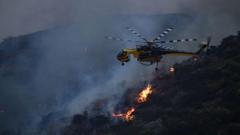Research published in JAMA suggests that more than 400 people died indirectly due to LA's January wildfires, highlighting the broader health impacts of such disasters.
Study Reveals 400+ Indirect Deaths Linked to LA Wildfires

Study Reveals 400+ Indirect Deaths Linked to LA Wildfires
A recent study estimates over 400 indirect fatalities associated with the LA wildfires of early 2023, surpassing official counts.
A new study has revealed that the devastating Los Angeles wildfires, which raged earlier this year, may be linked to over 400 indirect deaths. Published in the medical journal JAMA, the study examines fatalities resulting from issues exacerbated by the wildfires, including deteriorating air quality and healthcare accessibility challenges. This figure far exceeds the official death toll of 31 reported by Los Angeles County, which only considers direct fire-related casualties.
The research coincides with ongoing wildfires across the US and Canada that have triggered air quality warnings in numerous cities, including Chicago and Buffalo. The Palisades and Eaton fires in January led to significant destruction, evacuating more than 100,000 residents and destroying thousands of buildings.
The study’s authors estimated that approximately 440 deaths occurred from January 5 to February 1, as a direct result of the wildfires. By analyzing mortality data during the wildfires and comparing it to previous years, researchers noted a nearly 7% increase in deaths during this period. Causes ranged from respiratory and cardiovascular issues aggravated by wildfire smoke to delays in medical treatments for critical conditions due to fire-related interruptions.
The findings stress the importance for public health authorities to consider both direct and indirect fatalities when assessing the impacts of wildfires and similar climate events. The authors advocate for enhanced mortality tracking during and following wildfire emergencies to ensure accurate reporting of health outcomes.
The BBC has sought comments from Los Angeles County officials regarding these findings.
In related developments, a separate study published in JAMA on the aftermath of the devastating 2023 Maui wildfires revealed significant health declines among affected adults; 22% exhibited reduced lung function, and half reported depressive symptoms after the fires, which resulted in at least 102 deaths and extensive destruction.
Researchers emphasized the necessity for sustained clinical observation and mental health resources following climate catastrophes. The Maui study also highlighted alarming rates of suicide and drug overdoses occurring in the month after the wildfires.
The increasing frequency of wildfires, exacerbated by climate change, has prompted concerns regarding the broader health implications of wildfire smoke. Experts caution that smoke can severely damage immune function in the lungs, potentially leading to long-term cardiovascular issues, particularly among vulnerable populations like the elderly, pregnant women, and children.
As wildfires continue to ravage regions worldwide, their far-reaching effects on health and safety underscore the urgency of addressing climate change and enhancing disaster response strategies.


















